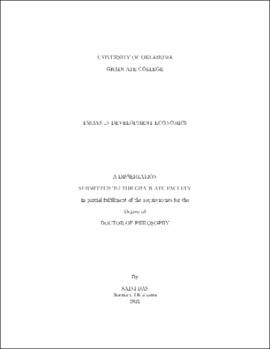| dc.contributor.advisor | Hamory, Joan | |
| dc.contributor.author | Das, Saini | |
| dc.date.accessioned | 2021-06-29T18:56:32Z | |
| dc.date.available | 2021-06-29T18:56:32Z | |
| dc.date.issued | 2021-08-05 | |
| dc.identifier.uri | https://hdl.handle.net/11244/330109 | |
| dc.description.abstract | My dissertation chapters study the impact of environmental factors on outcomes of human
functioning. The first chapter studies the impact of heat stress during a primary school leaving
exam in Indonesia on outcomes in later life. The Ebtanas are a national standardized
test that students must take to gain entry to secondary school. Using individual-level data
on test scores, I first show that cognitive performance during the test is affected by heat
stress. Impacts are heterogeneous across different subjects, with math and science being the
most heavily impacted. Next, I show that disruptive weather conditions during the Ebtanas
have compounding negative effects on a wide range of long-term achievements such as adult
educational attainment, labor market participation and entry to the marriage market. A 1C
increase in temperature in the month of exam leads to 1.53% fewer years of education, 2%
fewer hours worked and a 2% higher probability of being married by 18 for women. These
findings stress that even examinations conducted during early or mid adolescence may have
impacts that persist through adulthood.
The second chapter studies the repercussions of an agricultural productivity shock for
labor market outcomes and inequality in India. I show that the increase in productivity had
heterogeneous impacts on technological diffusion and local labor market outcomes. In wheat
growing areas, the productivity increase was followed by investments in labor-saving technology,
demonstrated by an increase in the use of tractors. Rice areas in contrast, invested
more heavily in labor-enhancing technology such as fertilizers, creating new opportunities
for application of labor. These shifts exacerbated inequality in wheat districts while reducing
inequality in rice districts. I show that these results are robust to fixed effects and
instrumental variables strategy. These findings demonstrate that driven by differences in
environmental factor endowments, a productivity shock can have heterogeneous impacts on
agricultural labor markets and inequality.
Chapter 3 examines the efficacy of genealogically constructed networks in sharing risk
under aggregate versus idiosyncratic income shocks in the context of geographically split-off
families in Indonesia. While informal transfers are effective in sharing aggregate risks, they
are ineffective in an idiosyncratic shock. Plausible reasons include a higher probability of
repayment as well as greater economies of scale from resource pooling. We show that idiosyncratic
shocks induce households to make long-term and costly changes to their household
structure. We demonstrate this in the formation of new split-off families over time who reside
outside the district. Our findings further reveal that controlling for shocks to members in a
family network is an important source of omitted variable bias in empirical estimations of
the impact of shocks on informal transfers. | en_US |
| dc.language | en_US | en_US |
| dc.subject | Development | en_US |
| dc.subject | Environment | en_US |
| dc.subject | Labor | en_US |
| dc.title | Essays in development economics | en_US |
| dc.contributor.committeeMember | Hicks, Daniel | |
| dc.contributor.committeeMember | Kuruc, Kevin | |
| dc.contributor.committeeMember | Ghosh, Pallab | |
| dc.contributor.committeeMember | de Beurs, Kirsten | |
| dc.date.manuscript | 2021-06-28 | |
| dc.thesis.degree | Ph.D. | en_US |
| ou.group | College of Arts and Sciences::Department of Economics | en_US |
